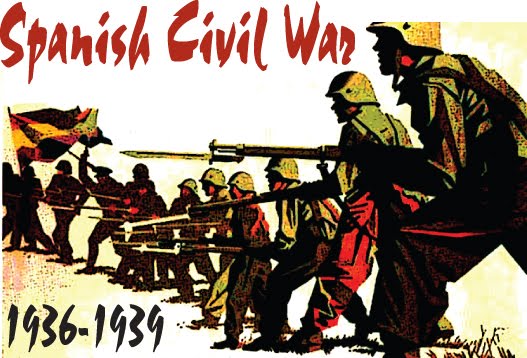Anarchists - Guernica
The Republican government responded to the threat of a military uprising with remarkable timidity and inaction. The CNT had warned Madrid of a rising based in Morocco months earlier and even gave the exact date and time of 5 A.M. on July 19, which it had learned through its impressive espionage apparatus. Yet, the Popular Front did nothing, and refused to give arms to the CNT. Tired of begging for weapons and being denied, CNT militants raided an arsenal and doled out arms to the unions. Militias were placed on alert days before the planned rising.
The rising was actually moved forward two days to July 17, and was crushed in areas heavily defended by anarchist militants, such as Barcelona. Some anarchist strongholds, such as Zaragoza, fell, to the great dismay of those in Catalonia; this is possibly due to the fact that they were being told that there was no "desperate situation" by Madrid and thus did not prepare. The Government still remained in a state of denial, even saying that the "Nationalist" forces had been crushed in places where it had not been. It is largely because of the militancy on the part of the unions, both anarchist and socialist, that the Rebel forces did not win the war immediately.
Anarchist militias were remarkably libertarian within themselves, particularly in the early part of the war before being partially absorbed into the regular army. They had no rank system, no hierarchy, no salutes, and those called "Commanders" were elected by the troops.
The most effective anarchist unit was the Durruti Column, led by already legendary militant Buenaventura Durruti. It was the only anarchist unit which managed to gain respect from otherwise fiercely hostile political opponents. However, they had a difficult time getting arms from a fearful Republican government, so Durruti and his men compensated by seizing unused arms from government stockpiles. Durruti's death on November 20, 1936 weakened the Column in spirit and tactical ability; they were eventually incorporated, by decree, into the regular army.
In 1936, the CNT decided, after several refusals, to collaborate with the government of Largo Cabellero. Many anarchists outside of Spain criticized the CNT leadership for entering into government and compromising with communist elements on the Republican side. It is true that in these years the anarchist movement in Spain gave up many of its basic principles; however, those in Spain felt that this was a temporary adjustment, and that once Franco was defeated, they would continue in their libertarian ways. There was also concern with the growing power of authoritarian communists within the government.
Along with the fight against fascism was a profound anarchist revolution throughout Spain. Much of Spain's economy was put under worker control; in anarchist strongholds like Catalonia, the figure was as high as 75%, but lower in areas with heavy socialist influence. Factories were run through worker committees, agrarian areas became collectivized and run as libertarian communes. Even places like hotels, barber shops, and restaurants were collectivized and managed by their workers.
The anarchist held areas were run according to the basic principle of "From each according to his ability, to each according to his need." In some places, money was entirely eliminated, to be replaced with vouchers. Under this system, goods were often up to a quarter of their previous cost. Despite the critics clamoring for maximum efficiency, anarchic communes often produced more than before the collectivization. The newly liberated zones worked on entirely libertarian principles; decisions were made through councils of ordinary citizens without any sort of bureaucracy.
During the Civil War, a reactionary Communist Party gained considerable influence due to the necessity of aid from the Soviet Union. Communists and "liberals" on the Republican side gave considerable effort to crush the anarchist revolution, ostensibly to bolster the anti-Fascist effort. Pravda announced in December of 1936 that "...the mopping up of Trotskyists and anarcho-syndicalists has already begun. It will be carried out with the same vigor as in the USSR." Another communist boldly proclaimed in an interview that they would "make short work of the anarchists after the defeat of Franco." Their efforts to weaken the revolution were ultimately successful: hierarchy was eventually restored in many of the collectivized areas, and power was taken away from workers and unions, to be monopolized by the Popular Front.
Most important, perhaps, were the measures to destroy the militias, who were arguably leading the war effort in spirit as well as in action. The militias were eventually declared illegal and technically merged with the Popular Army. This had the effect of demoralizing the soldiers and taking away what they had ultimately been fighting for: not for the Soviet Union, but for themselves and for freedom
.jpg)